Trump vs. the 15%
![]() The Great Repudiation
The Great Repudiation
 One week ago today, “the 15%” got their comeuppance.
One week ago today, “the 15%” got their comeuppance.
For several years now, I’ve observed periodically that the distribution of power in the United States bears a disturbing resemblance to the Oceania of George Orwell’s novel 1984.
There was “the Party” — which made up 15% of the population. About 2% belonged to the powerful Inner Party, while the other 13% belonged to the less-powerful Outer Party. The remaining 85% of the population were the proles.
As it happens, an investigation by a major newspaper chain found in 2013 that 1.6% of the U.S. population has some level of “access to classified material.” This rarefied group is your Inner Party.
The Outer Party in present-day America consists of government officials, military brass, CEOs, financiers, academics, media figures and the like. All the high and mighty… the wine-and-cheese set… the people with the capacity to wield their wealth, their credentials, their authority. That’s your other 13%.
In the America of 2024, the overlap between “the 15%” and the Democratic Party is considerable. As we chronicled early this year, this power elite believes everyday Americans have too much individual freedom… while in contrast, the government can be trusted to “do the right thing most of the time.”
 This year, the power elite’s contempt for everyday Americans became too obvious to ignore.
This year, the power elite’s contempt for everyday Americans became too obvious to ignore.
Time and again, everyday Americans were told their economic pain was a figment of their imagination. Official government numbers were all good — growing GDP, falling inflation rates, historically low unemployment rates. What could the proles possibly complain about?
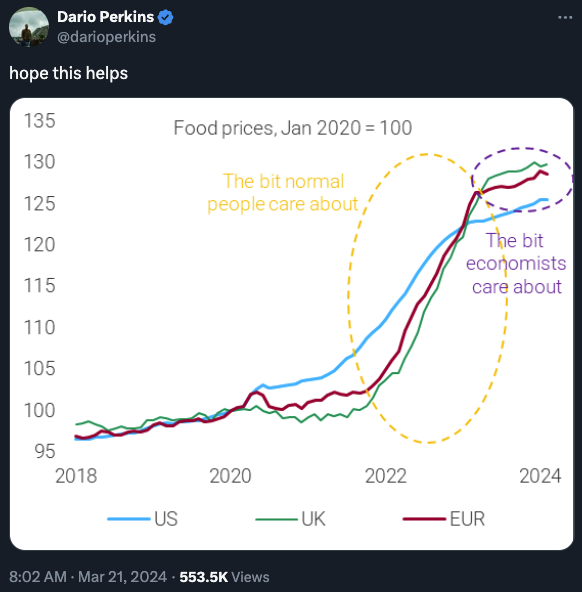
They were told the president was “sharp as a tack” — until the moment in late June when his cognitive decline became too obvious to cover up.
Then they were told one of the central figures in the cover-up would be his putative replacement — anointed by Inner Party elders meeting in what were once called “smoke-filled rooms.” (Cigarettes? Those are only for proles now…)
In the final days of the campaign they were told by elite media that the Republican nominee was so far beyond the pale that he wanted to put former Rep. Liz Cheney in front of a firing squad — a patently, provably untrue claim.
But for the media and the rest of the power elite, truth took a back seat to stopping the orange usurper by any means necessary. (“Misinformation for thee, but not for me…”)
In the 2024 general election… this power elite, this 15%, needed to be, deserved to be, had to be repudiated.
And because they had not yet achieved total dictatorship like “the Party” of Orwell… it is now done.
And their tears are delicious.

They’re like the Bourbon dynasty in France as (supposedly) described by Talleyrand: “They’ve learned nothing, and forgotten nothing.”
![]() Trump’s Counter-Elites
Trump’s Counter-Elites
 Unfortunately, the only vessel through which the proles could express their discontent with the 15% was an exceptionally flawed individual named Donald John Trump.
Unfortunately, the only vessel through which the proles could express their discontent with the 15% was an exceptionally flawed individual named Donald John Trump.
Trump crashed the gates this time surrounded by his own suspicious coterie of counter-elites — headlined, of course, by the richest man in the world, Elon Musk.
Much of this crew did not surround him eight years ago. Indeed, some were trying to thwart him at the time.
For instance, the co-chair of his transition team — billionaire Howard Lutnick, CEO of the Wall Street firm Cantor Fitzgerald. Early in the 2016 campaign cycle, Lutnick hosted a fundraiser for Hillary Clinton at his townhouse — which happened to be next door to a townhouse owned by a still-alive Jeffrey Epstein.
Other Clinton-backing billionaires are on Team Trump now — like the venture capitalist Marc Andreessen of Andreessen Horowitz. And there are still more longtime Democratic donors like Pershing Square’s Bill Ackman… along with one-time Never-Trump Republicans like Elliott Management’s Paul Singer.
And there’s more. During his brief business career, the incoming vice president JD Vance rubbed shoulders with the billionaire set — accepting funding from Andreessen as well as leading members of the Davos crew like Peter Thiel and former Google CEO Eric Schmidt.
What are their motives? Do these individuals have the proles’ interests at heart? Peace and freedom? A revival of middle-class prosperity?
Or is it more likely they’re on board with the vision expressed by Vance in 2021, a vision much like that of the 15% — that government should be used as a tool to “reward the things that we think are good” and “punish the things that we think are bad”?
And who the hell is “we” in that conception, anyway?
What follows will be — or should be, anyway — uncomfortable reading if you’re a Trump supporter.
But it’s not enough to repudiate the 15%. Trump too must be kept accountable in his second term — by the proles for the right reasons and not by the 15% with their fabricated “Russian collusion” twaddle.
Here are three broad themes worth watching in the months ahead…
![]() The Only Way to Prosperity
The Only Way to Prosperity
 Start with this reality: There’s no amount of tax cuts and deregulation that by themselves will nurse the country back to economic health.
Start with this reality: There’s no amount of tax cuts and deregulation that by themselves will nurse the country back to economic health.
No, if it’s enduring prosperity we want, then something’s got to be done about this chart that we’ve shared a couple of times this fall…
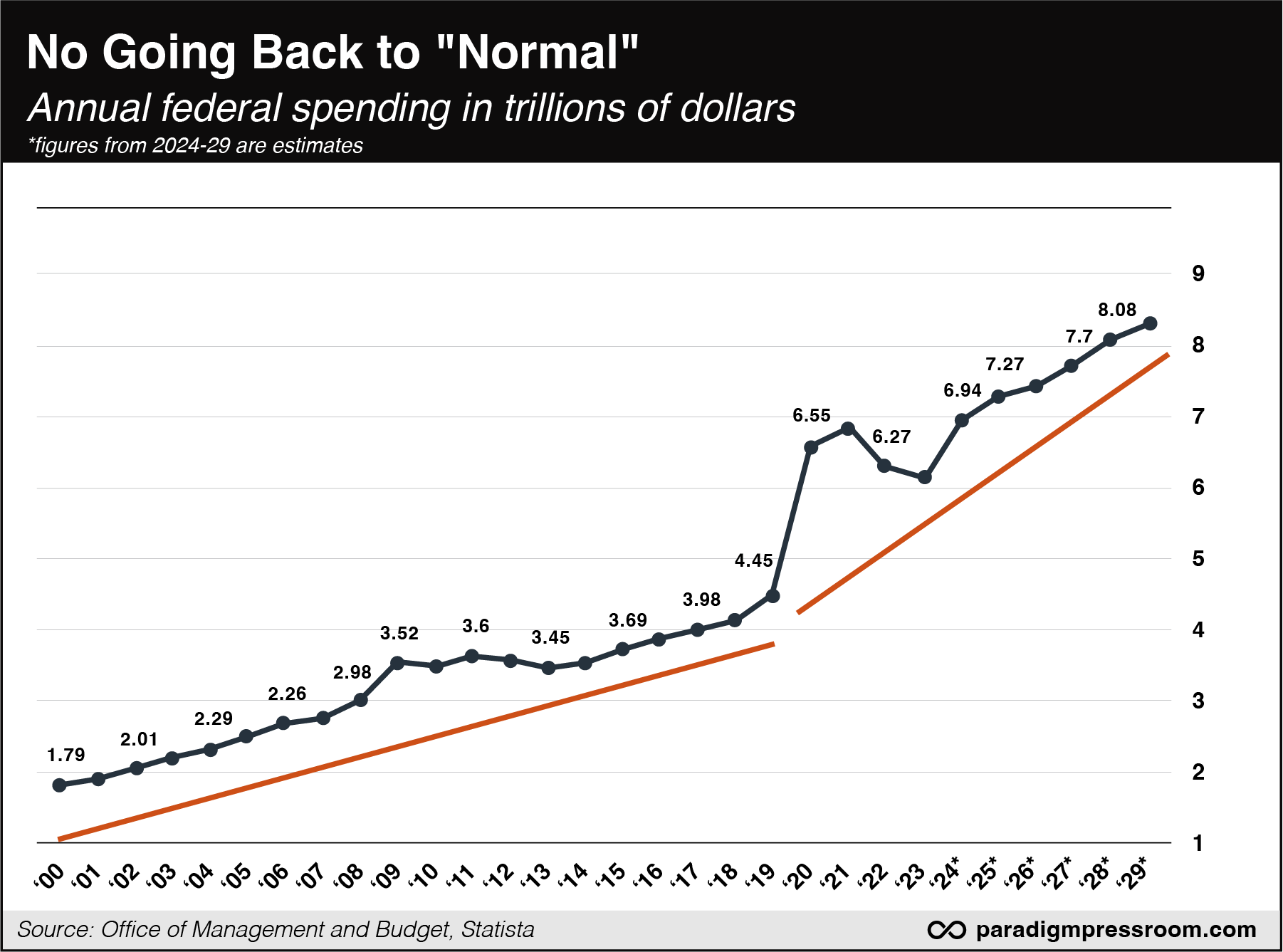
Starting in 2020, Trump and Biden together have set federal spending on a permanently higher trajectory relative to the first two decades of this century.
In theory it was a one-time response to COVID — after which we were supposed to return to a pre-pandemic “normal.”
But as you see from the chart, that’s not how it’s working out. Result: Uncle Sam’s annual budget deficit for fiscal year 2024 was $1.8 trillion.
That equals 6.4% of America’s annual economic output. The only times that percentage has been higher was during World War II, the 2008 financial crisis and the pandemic. But what’s the crisis now?
 Every dollar of deficit spending is a dollar extracted from the productive economy — as if a lead weight were attached to a sprinter’s leg.
Every dollar of deficit spending is a dollar extracted from the productive economy — as if a lead weight were attached to a sprinter’s leg.
Real, lasting prosperity will come only when federal spending is brought back under control.
Elon Musk is onto something when he says, “I think we can reduce the annual federal budget by at least $2 trillion per year.” That would zero out the deficit.
We await word of whether Trump will take up Musk on his offer to spearhead a “Department of Government Efficiency” with that mission.
In the meantime, all we’ve got is a lame promise to eliminate the Department of Education — whose $79 billion annual budget amounts to less than 1.2% of all federal spending.
Republicans have been threatening to shut down the Department of Education ever since Jimmy Carter set it up in 1979 — and they never follow through, even when they control the White House and both houses of Congress.
Why would they — when a promise to eliminate the Department of Education is a staple of Republican fundraising letters?
 Meanwhile, Trump’s trial balloon about abolishing the income tax and relying mostly on tariff revenue to finance the government’s operations is…
Meanwhile, Trump’s trial balloon about abolishing the income tax and relying mostly on tariff revenue to finance the government’s operations is…
… well, on the one hand, he has a point when he says tariffs were the government’s main source of revenue before the advent of the income tax in 1913.
But on the other hand, the government was much, much smaller then. The 20th-century sociologist Robert Nisbet was born in 1913; he once observed that in that year, the only contact most Americans had with the federal government was the Post Office.
That hasn’t been the case for many decades.
➢ The only serious proposal to scrap the income tax would be a constitutional amendment repealing the Sixteenth Amendment that authorized the income tax in the first place. Now that would be fun to watch Trump use his bully pulpit to advance.
In the final analysis, there are two and only two ways to meaningfully shrink the size and scope of the federal government as it exists today: a) eliminate the health care cartel and b) neuter the military-industrial complex.
And Trump has already sold out on b)...
![]() The Pompeo Bait-and-Switch
The Pompeo Bait-and-Switch
 For anyone who labored under the delusion that Trump would be the “antiwar” president, the last 72 hours have been an eye-opener.
For anyone who labored under the delusion that Trump would be the “antiwar” president, the last 72 hours have been an eye-opener.
First came this Trump announcement on Saturday — clearly a response to a staggering amount of online vitriol directed at his ex-Secretary of State and CIA director Mike Pompeo.
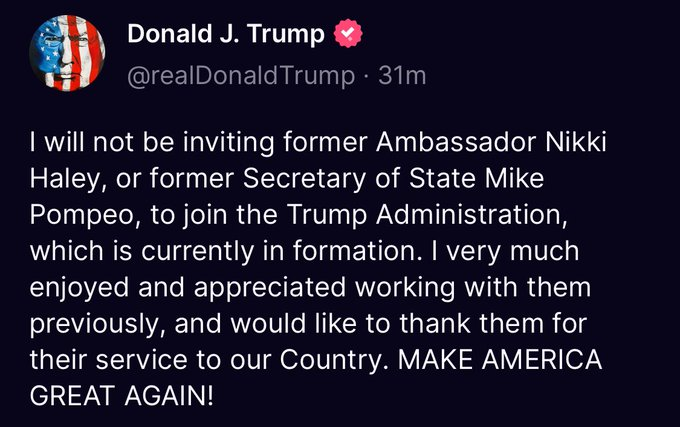
Which, superficially, was fine. The problem is all the other warmongers jockeying for position within a second Trump administration.
After Trump’s announcement, the podcaster and comedian Dave Smith said it was imperative to keep the hammer down — and Donald Trump Jr. tweeted a thundering concurrence.
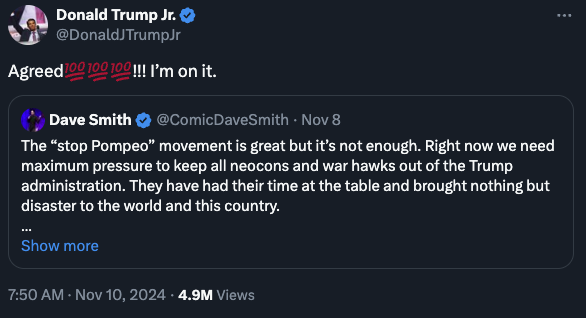
Then yesterday came the appointments and prospective nominations — Rep. Mike Waltz (R-Florida) as national security adviser, Rep. Elise Stefanik (R-New York) as UN ambassador and Sen. Marco Rubio (R-Florida) as secretary of state.
Every one of them is “substantively interchangeable with Mike Pompeo and Nikki Haley,” says our favorite political reporter Michael Tracey.
Rubio in particular “never met a war he didn’t want somebody else to fight,” quips independent journalist Ryan Grim.
Perhaps seeing the writing on the wall, Don Jr. announced he won’t have a role in the administration; instead he’s joining a venture capital firm that “focuses on investing in companies and products popular with conservative audiences,” says The New York Times.
 So now there’s a high risk that the guy who rode into office on a wave of revulsion with endless Middle East wars will launch… another Middle East war.
So now there’s a high risk that the guy who rode into office on a wave of revulsion with endless Middle East wars will launch… another Middle East war.
“Trump is staffing his new administration with pro-Zionists who are likely to press for a conflict with Iran,” writes former CIA analyst Larry Johnson.
Retired Col. Lawrence Wilkerson is likewise concerned. Wilkerson was the longtime aide to Colin Powell who’s spent the last 20-plus years making amends for helping his boss gin up the Iraq War.
Wilkerson describes Trump’s general disposition as one of “disdain for war” — but with perhaps one critical exception.
“This is the one place where Trump really worries me—doing everything in his power for Israel,” Wilkerson tells journalist Chris Hedges. “And Trump has made it quite clear that that’s his policy, that’s his belief, and I think he’s being honest about it.”
Wilkerson reminds us that Israeli Prime Minister Benjamin Netanyahu is “intent on going after Iran, but he’s intent on the United States going with him.”
It won’t end well: “We’re going to get our rear ends handed to us if we do what Netanyahu wants to do with regard to Iran,” Wilkerson warns.
Indeed, every tabletop exercise the Pentagon runs with an Iran war ends badly.
 Even if warfare with Iran is restricted to the economic realm, it won’t go well.
Even if warfare with Iran is restricted to the economic realm, it won’t go well.
Friday’s Wall Street Journal reported that Trump “plans to drastically increase sanctions on Iran and throttle its oil sales.”
The details were thin — not least because along with Russia, Iran is already one of the most-sanctioned countries on the planet.
The only meaningful step Washington hasn’t taken yet is a full-blown oil embargo — which is “easier said than done,” tweets the military analyst William Schryver.
“China is the buyer of over 90% of Iranian oil,” he points out. “Suppose they start escorting oil shipments from Iran.” Alternatively, “suppose Iran retaliates by selectively blockading the Strait of Hormuz.”
Too, any Iran oil embargo will only accelerate the process of “de-dollarization” that’s been underway for over a decade, undermining the dollar’s status as the globe’s reserve currency.
Biden’s unprecedented sanctions on Russia have made other governments around the world wonder if they’re next. Result: Scads of U.S. dollars that used to be parked overseas are now flooding back home — one of the reasons inflation has been so persistent in recent years.
A Trump oil embargo targeting Iran will make a bad situation worse.
![]() Wartime Censorship?
Wartime Censorship?
 Even on the one topic where Trump and his supporters could draw their clearest distinction versus “the 15%”... danger remains.
Even on the one topic where Trump and his supporters could draw their clearest distinction versus “the 15%”... danger remains.
We’re talking about censorship — the subject of regular attention in this space for over six years.
Within the last 24 hours, Musk’s X-formerly-Twitter has disabled the search function for Donald Trump’s account.
No reason has been announced… but it sure is convenient at this moment to memory-hole Trump’s previous criticisms of Marco Rubio, not least this dead-on gem from 2015…
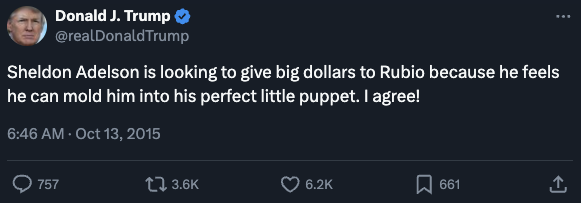
 On a much more serious note, there’s the question of wartime censorship in the event of a U.S. attack on Iran.
On a much more serious note, there’s the question of wartime censorship in the event of a U.S. attack on Iran.
There was a disturbing foreshadowing last month when Trump delivered a speech marking the first anniversary of Hamas’ attack inside Israel.
“We will remove the jihadist sympathizers and Jew haters,” he said. “We’re gonna remove the Jew haters who do nothing to help our country.”
Exactly who would be classified as “jihadist sympathizers and Jew haters”?
Would that include critics of U.S. aid to Israel? Tucker Carlson? Candace Owens? Or just the lefty campus protesters?
And how exactly would they be “removed”?
We’ll leave it there for today. Revel in the humiliation of the 15%. But recognize, at the same time, the old saw about eternal vigilance being the price of liberty…
Best regards,

Dave Gonigam
Managing editor, Paradigm Pressroom's 5 Bullets
P.S. As for the markets today, it was inevitable: U.S. stocks are, however briefly, coming off their post-election night euphoria.
All the major U.S. indexes are in the red — the Dow by the most, down a half percent but still over 44,000. Small caps are taking a bigger breather, the Russell 2000 down 1.5%.
Gold, alas, has slipped below $2,600. Silver is down to $30.44. Crude is stabilizing at $68.16.
Bitcoin is holding fast near record highs at $87,530.
At least the hedge fund manager John Paulson won’t be joining the administration as Treasury secretary. “My complex financial obligations would prevent me from holding an official position in President Trump’s administration at this time,” he said in a statement.
Really? So why did he go out of his way to advertise his availability for the job before the election? Hmmm…










